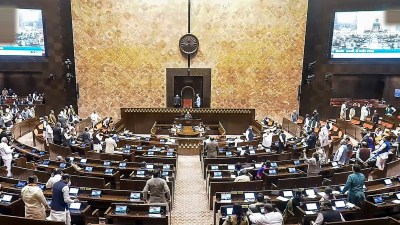Click here to join Express Pune WhatsApp channel and get a curated list of our stories
PCMC English language initiative helping transform learning in civic schools: Officials
The transformation comes through the English as a Second Language (ESL) initiative launched by the Pimpri-Chinchwad Municipal Corporation (PCMC) two years ago.
 Focused initially on Classes 1 and 2, the programme has already reached over 27,000 students and is being hailed as a model for teacher-led change in public education, officials said. (File Photo)
Focused initially on Classes 1 and 2, the programme has already reached over 27,000 students and is being hailed as a model for teacher-led change in public education, officials said. (File Photo)In a sign of change sweeping through schools run by the Pimpri-Chinchwad Municipal Corporation, English does not seem any longer to be a subject feared by students and teacher. In fact it’s becoming a language of confidence, expression, and joy, said civic officials.
The transformation comes through the English as a Second Language (ESL) initiative launched by the Pimpri-Chinchwad Municipal Corporation (PCMC) two years ago.
Focused initially on Classes 1 and 2, the programme has already reached over 27,000 students and is being hailed as a model for teacher-led change in public education, officials said.
“When I first received the English practice book, I could see the change almost immediately,” said Sharmistha Babar, teacher at Chhatrapati Shahu Maharaj Primary School, Dighi Kanya Shala. “The reading skills and vocabulary of my students in Classes 1 and 2 have improved significantly. Because the training is activity-based and designed around real classroom needs, even teachers feel more excited and stress-free while teaching English.”
The initiative began with monthly training workshops for 200 lower primary teachers, focusing on foundational skills like phonics, classroom interaction, and creating print-rich environments. But its biggest strength has been its responsiveness—listening to teachers, adapting to student needs, and placing educators at the centre of the reform, officials said.
“The fear of English has reduced—not just among students, but also among teachers,” said Sagar Gaikwad, teacher at Kanya School No. 31, Dapodi.
“These trainings have been useful for both. The English practice book given to every child has helped them build strong reading foundations and boosted their confidence. This was reflected clearly in our annual assessments.”
In response to teacher feedback, a group of 10 civic school teachers co-created a 300-page English Practice Book, rolled out in three stages—from alphabet recognition to paragraph reading. The book has become a dual-purpose tool: enabling effective classroom learning and helping monitor student progress.
“This initiative is rooted in a simple idea—trust your teachers. When we support them with training and tools, they become change-makers. The ESL programme has not only improved English learning, but also restored faith in our public schools,” Pimpri-Chinchwad Municipal Corporation chief Shekhar Singh said.
To sustain and scale the effort, PCMC has created a cadre of Master Trainers—senior teachers who now conduct peer trainings, design resources, and mentor fellow educators. These trainers, drawn from the first cohort, have played a vital role in embedding quality practices across schools.
Additional Commissioner Pradip Jambhale Patil added, “We didn’t just bring in a new curriculum—we built a community of teacher-leaders. The sense of ownership among educators is what makes this initiative sustainable. It’s no longer a project; it’s a movement.”
Encouraged by its success, PCMC has extended the initiative to Classes 3, 4, and 5, developing new practice books and training modules tailored to older learners. The content was co-created by more than 20 contributors, including PCMC teachers, Teach For India fellows, civic officials, and even students.
Beyond English, the ESL strategies are now influencing how other subjects—like Marathi and Environmental Science—are taught. Teachers have begun using questioning techniques, group work, and storytelling across the curriculum.
From hesitant beginnings to confident storytelling, PCMC’s ESL initiative shows what’s possible when public education trusts its teachers and gives them the tools to lead.
Click here to join Express Pune WhatsApp channel and get a curated list of our stories







